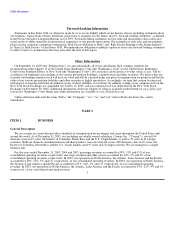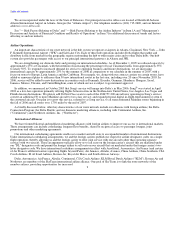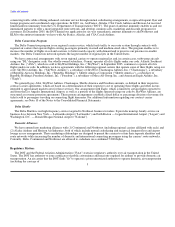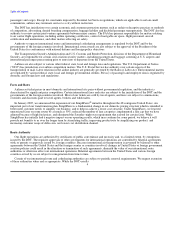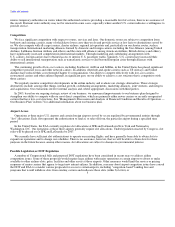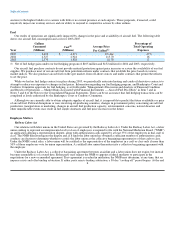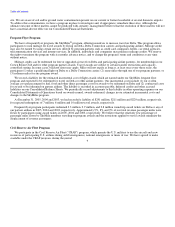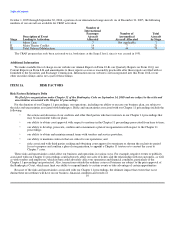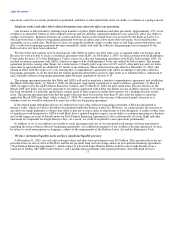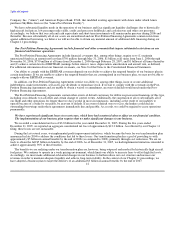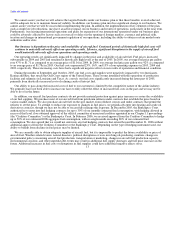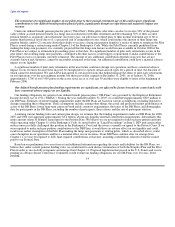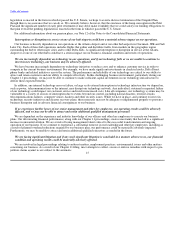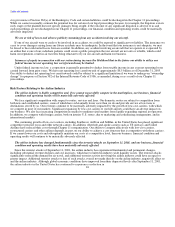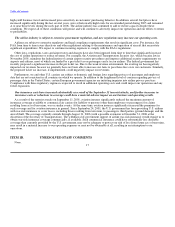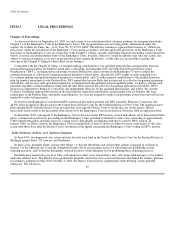Delta Airlines 2005 Annual Report Download - page 16
Download and view the complete annual report
Please find page 16 of the 2005 Delta Airlines annual report below. You can navigate through the pages in the report by either clicking on the pages listed below, or by using the keyword search tool below to find specific information within the annual report.
Table of Contents
operations cannot be accurately predicted or quantified, and there is substantial doubt about our ability to continue as a going concern.
Employee strikes and other labor-related disruptions may adversely affect our operations.
Our business is labor intensive, utilizing large numbers of pilots, flight attendants and other personnel. Approximately 17% of our
workforce is unionized. Strikes or labor disputes with our and our affiliates' unionized employees may adversely affect our ability to
conduct our business. Relations between air carriers and labor unions in the United States are governed by the Railway Labor Act,
which provides that a collective bargaining agreement between an airline and a labor union does not expire, but instead becomes
amendable as of a stated date. The Railway Labor Act generally prohibits strikes or other types of self-help actions both before and
after a collective bargaining agreement becomes amendable, unless and until the collective bargaining processes required by the
Railway Labor Act have been exhausted.
We have been and continue to be in negotiations with ALPA to reduce our pilot labor costs as required under our business plan.
Because we were not able to reach a consensual agreement with ALPA, on November 1, 2005, we filed a motion with the Bankruptcy
Court under Section 1113 of the Bankruptcy Code to reject our collective bargaining agreement with ALPA. In December 2005, we
reached an interim agreement with ALPA, which was approved by the Bankruptcy Court and ratified by Delta's pilots. The interim
agreement provides, among other things, for a reduction in (1) hourly pilot wage rates of 14% and (2) other pilot pay and cost items
equivalent to approximately an additional 1% hourly wage reduction. These reductions became effective December 15, 2005, and
remain in effect until the earlier of (1) our entering into a comprehensive agreement with ALPA on changes to the pilot collective
bargaining agreement; or (2) the time that the neutral panel described below issues its final order as to whether Delta is authorized to
reject the pilot collective bargaining agreement under the legal standards of Section 1113.
The interim agreement provides that Delta and ALPA will seek to negotiate a tentative comprehensive agreement, and establishes
the March 2006 time limits: (1) March 1, 2006, for the parties' negotiating committees to reach a tentative agreement; (2) March 8,
2006, for approval by the ALPA Master Executive Council; and (3) March 22, 2006, for pilot ratification. Because the first of the
March 2006 time limits was not met, pursuant to our interim agreement with ALPA, the matter at issue in Delta's Section 1113 motion
has been submitted to a mutually agreed upon, neutral panel of three experts in airline labor matters for a binding decision on that
issue. The interim agreement provides that the panel's decision must be issued no later than 45 days after the failure to meet the
applicable March 2006 time limit, which is April 15, 2006. We cannot predict the outcome of the neutral panel's decision as to
whether or not we would be authorized to reject the collective bargaining agreement.
If the neutral panel determines that we are authorized to reject the collective bargaining agreement, ALPA has threatened to
initiate a strike, which we believe should not be permitted under the Railway Labor Act. However, we cannot predict the outcome of
any effort we might undertake to obtain court relief to prevent or stop a strike or other forms of work disruption. A strike or other form
of significant work disruption by ALPA would likely have a material negative impact on our ability to continue operating our business
and would trigger an event of default under our Post-Petition Financing Agreements if all or substantially all of our flight and other
operations are suspended for longer than two days. As a result, we could be required to cease operations permanently.
In addition, if we or our affiliates are unable to reach agreement with any of our unionized work groups on future negotiations
regarding the terms of their collective bargaining agreements, or if additional segments of our workforce become unionized, we may
be subject to work interruptions or stoppages, subject to the requirements of the Railway Labor Act and the Bankruptcy Code.
We have substantial liquidity needs and face significant liquidity pressure.
At December 31, 2005, our cash and cash equivalents and short-term investments were $2.0 billion. This amount reflects the net
proceeds from our sale of ASA to SkyWest and the net proceeds from our borrowings under our post-petition financing agreements
("Post-Petition Financing Agreements"), which consist of a Secured Super-Priority Debtor-in-Possession Credit Facility from a
syndicate of lenders (the "DIP Credit Facility") and a modification agreement with American Express Travel Related Services
11


